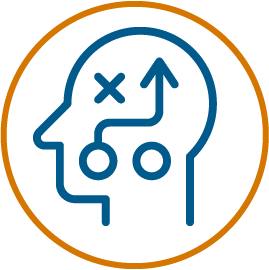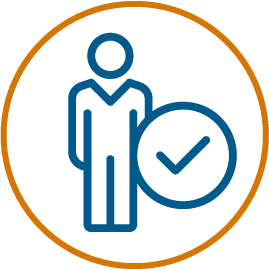Become eligible for licensure in advanced nursing practice (APN).
Program Type
Master's
Semester Start
Fall, Spring
Study Options
Hybrid
Minimum Duration
2 Years
 UMass Boston’s Nursing MS focuses on preparing you to take national nursing certification exams and apply for licensure in advanced nursing practice (APN) in family nursing or adult-gerontological nursing. It’s designed for registered nurses (RNs) with a bachelor’s degree and working nurses who want to focus their practice in family or adult-gerontological care and add a master’s degree to their résumé. Rigorous academic courses and rich clinical experiences with on-site instruction promote best practices and provide you with an exceptional skill set. Use these skills to improve the quality of care you provide and focus your practice in family or adult-gerontological care.
UMass Boston’s Nursing MS focuses on preparing you to take national nursing certification exams and apply for licensure in advanced nursing practice (APN) in family nursing or adult-gerontological nursing. It’s designed for registered nurses (RNs) with a bachelor’s degree and working nurses who want to focus their practice in family or adult-gerontological care and add a master’s degree to their résumé. Rigorous academic courses and rich clinical experiences with on-site instruction promote best practices and provide you with an exceptional skill set. Use these skills to improve the quality of care you provide and focus your practice in family or adult-gerontological care.
U.S. News & World Report ranks UMass Boston’s Nursing Master’s Program No. 63 on the list of 2022 Best Nursing Schools: Master's.
Our master’s program for baccalaureate-prepared registered nurses is distinct for its academic rigor, rich clinical experiences coupled with on-site instruction, and promotion of best practices. By joining our program, you will become part of an exceptionally diverse student and faculty community of nationally recognized researchers, clinical nursing educators, and practitioners.
Tuition
- The Adult-Gerontological (AGNP) and Family Nurse Practitioner (FNP) programs consist of ten 3-credit courses and three 6-credit courses, or 48 credits.
- Online tuition is $600 per credit.
- College of Nursing Fee per semester is $700/Fall & Spring, $350/Summer & Winter.
- Other fees as applicable.
- Estimated total program cost for the Nursing MS program* is $33,000.
* Estimate is based on completing the program by minimum duration. Other fees may apply. Request Info to connect with a program representative for further details.
Deadline
- Applications are due by March 31 to start in the fall
- Applications are due by October 1 to start in the spring
Application Checklist
- Completed online application form
- Personal statement
- Official transcripts from all schools attended — a Bachelor’s Degree with a GPA of 3.0 or better is recommended for admission to the program
- Two professional references
- Résumé
- Copy of your MA RN license
Applicants must have at least one year of clinical experience before applying to the Nursing MS program.
Please see the general graduate application requirements for more information. For questions about these requirements or the application process, contact the Office of Graduate Admissions at graduate.admissions@umb.edu or at 617.287.6400.
Required Courses (All Concentrations):
- Introduction to Advanced Practice Nursing: Knowledge for Practice in the Global Community (NURSNG601) (HLL)
Get a foundational context for the global, inclusive environment in which advanced practice nurses participate in the care of diverse populations. You’ll focus on the integration of knowledge from nursing and the biopsychosocial fields for the continual improvement of advanced practice nursing care across diverse populations and settings. Populations are defined in the context of diversity of age, gender, race/ethnicity, culture, language, sexual orientation, abilities, religion, and socioeconomic status, as well as those that may be underserved, vulnerable populations or experience health disparities. The course builds on your understanding of nursing knowledge gained in your undergraduate studies and provides the opportunity to analyze a broad spectrum of conceptual and theoretical frameworks from multiple disciplines. You’ll select a nursing conceptual-theoretical framework to explore in-depth and to apply to advanced nursing practice with a selected population and health condition of interest. - Advanced Pathology (NURSNG614) (online)
Gain the pathophysiological knowledge required of the advanced practice nurse to practice in the management of pathophysiological disorders in primary and tertiary care settings. You’ll study genetic and cellular mechanisms of diseases, the immune responses, and selected disorders throughout the lifespan. You’ll explore current research findings and theory relevant to the pathophysiology of common illnesses. You’ll analyze laboratory data in light of actual and potential pathophysiological processes. Special emphasis is given to the case study presentations to aid student application of pathophysiologic process to advanced nursing practice in diverse populations. - Advanced Health Assessment Practicum (NURSNG615) (online)
In this course, you’ll focus on the development of advanced practice nursing knowledge and skills in health assessment with an emphasis on diverse populations. Concepts, theories, and research germane to the scientific underpinnings for practice in the context of the bio-psycho-social and environmental domains of human development are emphasized. You’ll develop critical thinking, diagnostic reasoning, and communication skills through practice with case guided vignettes and simulated or clinical practice experiences specific to your area of advanced practice nursing. This course builds on your ability to utilize scientific foundations learned in previous courses and lays the foundation for subsequent clinical courses. - Evidence Based Practice I: Appraising the Strength and Significance of Evidence (NURSNG616) (online)
In this course, you’ll focus on the critical appraisal of health-related research to prepare yourself to identify best practices and translate evidence to clinical practice, population health, or health policy and analysis. Emphasis will be placed on evaluating multiple sources of existing evidence as the first step in identifying knowledge, practice or policy gaps, and in translating evidence to improve outcomes, quality, safety, cost, and access to care for individuals and populations. You’ll also explore ethical issues in the conduct of research and translation of evidence. - Introduction to Health Policy, Finance and Ethics (NURSNG618) (online)
Focus on how issues and trends in health policy, economics, and ethics are linked to the U.S. health care delivery system and other international health care systems. The role of the advanced practice nurse in developing a professional ethical framework, understanding the economic implications of health care, and in shaping and formulating health policy will be stressed with a focus on application of course concepts for the advanced practice nurse. You’ll also analyze relevant evidenced based research in health policy, economics, and ethics. - Advanced Pharmacology for the Advanced Practice Nurse (NURSNG634) (online)
In this course, you’ll focus on the pharmacological knowledge required by the advanced practice nurse to safely care for and counsel patients with physical and mental illnesses across the lifespan. You’ll synthesize knowledge of clinical pharmacokinetics and pharmacodynamics in the management of common disease processes occurring in pre-and post-natal women, infants, children, adolescents, adults, and elders. You’ll analyze and discuss current research findings related to pharmacotherapeutic therapies for patients in the community and tertiary care settings. Guided by faculty prepared in pharmacology and experienced in applying the science of clinical pharmacology in the practice setting, you’ll apply your knowledge of pharmacotherapeutics to the care of patients throughout patient transitions of care. - Mental and Psychosocial Health of the Urban Family (NURSNG637) (online)
In this course, you’ll consider multicultural individuals and families at risk for mental and psychosocial problems within the context of urban living. You’ll apply nursing theory and research to developing processes of care for individuals across the lifespan with mental health and psychosocial problems. You’ll learn evidence-based care, including cognitive-behavioral, psychopharmacological, and non-traditional approaches to psychosocial and related physical problems. You’ll also investigate research related to environmental, psychosocial, genetic, economic, family systems, developmental risk factors, drug efficacy, and nonpharmacological approaches for individuals with mental and psychosocial illness. You’ll also explore the impact of contemporary health care policy and legislative proposals on quality, cost, and access to care. - Advanced Health Promotion and Disease Prevention Across the Lifespan (NURSNG640)
Analyze the clinical application of theories and research from nursing, health promotion, and disease prevention. Examine family, human development, patient education, and community theories that inform patient/family centered care. You’ll examine data grounded in epidemiological sources, health histories, family assessments, physical examinations, diagnostic tests, and community assets as the basis for case findings and identification of risk factors. You’ll begin to institute primordial, primary, and secondary interventions tailored to diverse populations; demonstrate interdisciplinary communication skills; examine collaborative community partnerships; and analyze the dimensions of the advanced nursing professional leadership role in diverse communities. This course requires 150 hours. - Health Informatics (NURSNG715) (online)
Learn advanced practice nursing competencies related to computer skills, informatics skills, and informatics knowledge. You’ll apply information theory and computer technology skills, directed towards improving the organization and delivery of health care to multicultural populations receiving primary, secondary, and tertiary health care. Health Informatics deals with using technology tools for optimizing the collection, verification, and utilization of data that relates to generating knowledge to inform best practices and leadership in both public and private health systems. You’ll be directed to investigate ways in which information systems can address disparities in health services. - Primary Care of Adults (NURSNG639)
This course provides you with knowledge related to the assessment and management of patients with acute and chronic health care problems encountered by nurse practitioners in family practice and adult/gerontological primary care settings. You’ll analyze the direct and indirect components of the nurse practitioner role related to primary health care. You’ll apply evidence-based guidelines and research to support diagnostic, therapeutic, and pharmacological regimens. Emphasis will continue to be placed on the application of culturally sensitive nursing care to a diverse population, where diversity includes age, gender, race, ethnicity, culture, religion, sexual orientation, abilities, and socioeconomic status. - Primary Care of the Adult Practicum (NURSNG670)
Refine your advanced practice skills with further attention to the application of theory and evidence-based knowledge to the role of the family or adult/gerontological nurse practitioner. You’ll examine the assessment, diagnostic, therapeutic, evaluative, consultative, and teaching functions of the nurse practitioner role within a professional, ethical, and legal framework. You’ll continue to gain experience in the assessment and management of health promotion and episodic and chronic illness problems in adults with the supervision of nurse practitioner or physician preceptors, and faculty support. Seminar discussions include an exploration of special topics in disease management to improve quality, access, and cost of primary health care for diverse populations. You’ll also discuss diversity, health care disparities, and ethical issues as they relate to the clinical topics. This practicum includes 225 clinical hours in internal medicine or family practice.
Additional Courses for the Adult/Gerontological Nurse Practitioner Concentration:
- Primary Care of the Older Adult (NURSNG671) (online)
In this course, you’ll focus on the health care issues and needs of elders across the care continuum of acute, chronic, community, and long-term care settings. You’ll explore aspects of physical, emotional, cultural, and social aging across the lifespan utilizing various theoretical perspectives and models. The assessment, teaching-coaching, and management roles of the advanced practice gerontological nurse in relation to acute and chronic health conditions of the older adult are emphasized. - Primary Care of the Older Adult Practicum (NURSNG672) (online)
Further refine your skills in critical thinking and clinical reasoning in the application of theory and research to practice. Apply assessment, diagnostic, therapeutic, and health teaching strategies to a continuum of health promotion/illness problems with a focus on the primary care of adults and older adults across the continuum of care. Build skills in seeing increasingly complex patients with a combination of higher risk, acute illness, and chronic health problems where atypical disease presentation and challenges to disease treatment exist. Seminars are grounded in learning the application of theory and research to the domains of practice of the adult/gerontological nurse practitioner, including the management of patient health and illness, the teaching-coaching function of the nurse practitioner, and ensuring the quality of health care services. You’ll develop interdisciplinary collaborative practice skills. You’ll also develop role competencies under the supervision of nurse practitioner or physician preceptors and faculty in a variety of health care settings. Seminar discussions include an exploration of special topics in disease management to improve quality, access and cost of primary health care for diverse populations (or communities) with an emphasis on underserved populations where diversity includes age, gender, race/ethnicity, culture, religion, language, sexual orientation, abilities, and socioeconomic status. This practicum includes 225 clinical hours in internal medicine.
Additional Courses for the Family Nurse Practitioner Concentration
- Primary Care of the Childbearing Family (NURSNG681) (online)
This course builds on human growth and development to focus on acquiring knowledge related to the assessment and management of patients with acute and chronic health care problems encountered by nurse practitioners in family practice and pediatric primary care settings. You’ll analyze problems of pregnant women, infants, children and adolescents within a family nurse practitioner framework for practice. You’ll apply evidence-based laboratory, diagnostic, therapeutic, and pharmacological plans of care to problem management. Continued emphasis is placed on application of culturally sensitive nursing care to a diverse population where diversity includes age, gender, race, ethnicity, culture, religion, sexual orientation, abilities, and socioeconomic status. - Primary Care of the Childbearing Family Practicum (NURSNG682) (online)
Further refine your skills in critical thinking and clinical reasoning. You’ll apply assessment, diagnostic, therapeutic, and health teaching strategies to a continuum of health promotion/illness problems of women, infants, and children. Seminars are grounded in learning the application of theory and research to the domains of practice of the family nurse practitioner with emphasis on the management of patient health and illness and the teaching-coaching function of the nurse practitioner in the specialty of pediatrics and obstetrics. You’ll develop role competencies under the supervision of nurse practitioner preceptors and faculty in urban health care settings. Seminar discussions include an exploration of special topics in disease management to improve quality, access, and cost of primary health care for diverse populations (or communities) with an emphasis on underserved populations where diversity includes age, gender, race/ethnicity, culture, religion, language, sexual orientation, abilities, and socioeconomic status. This practicum includes 225 clinical hours.
At the end of this two-year program, you’ll be awarded a Master of Science in Nursing. The degree will demonstrate your expertise in the field on your résumé, as well as in interviews and workplace evaluations. With this degree, you’ll become eligible to take national nursing certification exams and apply for licensure in advanced nursing practice (APN) in family nursing, adult-gerontological nursing, or adult-gerontological acute care clinical nursing. You'll also have the option to apply for UMass Boston's Nursing Post-Master's Certificate (PMC) or Nursing DNP programs.
Recent Graduates
Employers include:





Why UMass Boston Online?
Value
Among the lowest online tuition rates of an accredited, public research university.
Flexibility
Study full-time to finish fast, or part-time to suit your schedule. Live sessions scheduled with the working professional in mind.
Authenticity
The same courses taught by the same academic departments as on campus. No third-party providers.
Learn More





